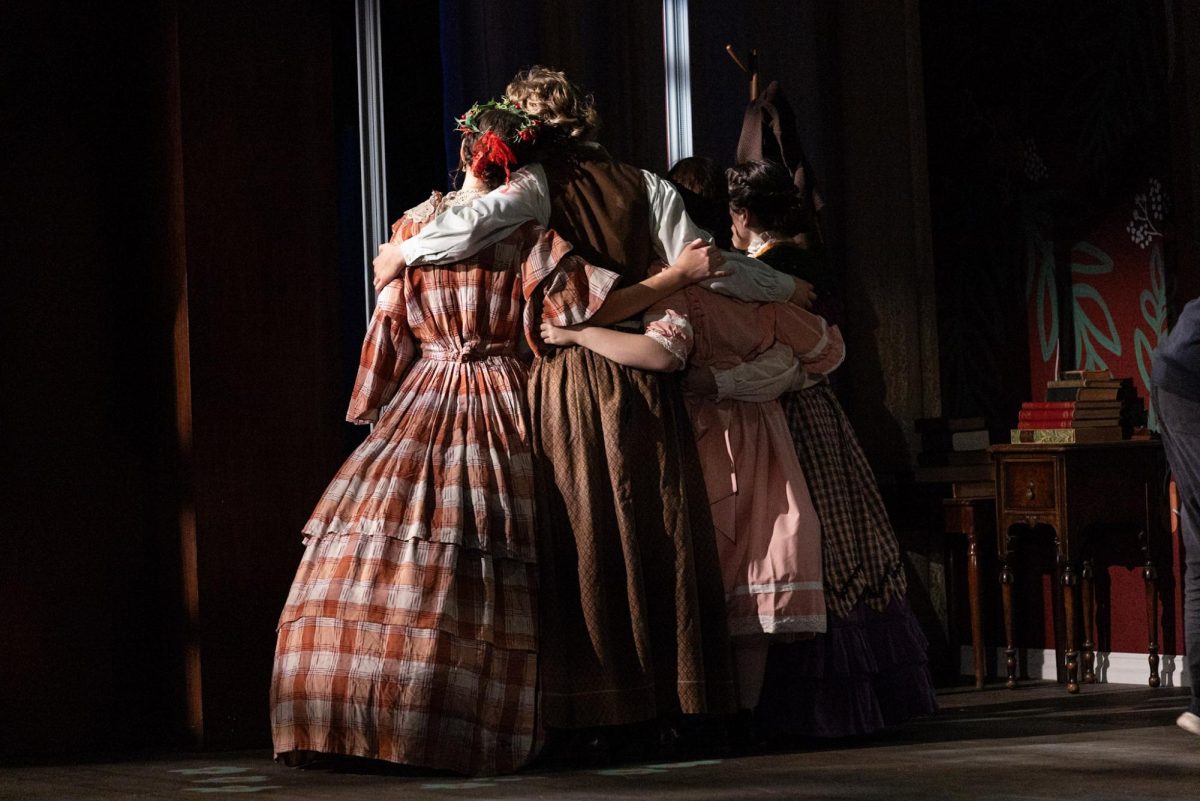The story “Little Women” has taken many forms. Originally written in the late 1860s by American author Lousia May Alcott, the celebrated book about the March family has been the subject of numerous adaptations both on and off the screen. Its latest evolution? A feminist retelling by playwright Kate Hamill, which simplifies the lengthy story into a snappy, entertaining play with a few extra musings on womanhood for good measure.
This retelling was staged this weekend by the Flintridge Sacred Heart Academy Visual and Performing Arts Department, marking the culmination of months of rehearsals and revisions. The work that went into the production was evident. The stage, usually a dusty black, was painted with delicate flowers. Above it hung large rafters, and in its center was an ever-crackling fireplace. The fireplace held many secrets: it was cleverly flipped down for use as a bed during the show’s dramatic second half (a transition that happened so quickly as to go largely unnoticed by the audience, owing to the show’s stellar crew), and on its mantel stood a replica of a painting by Louisa May Alcott’s sister May, made by FSHA student Madeline Manzo ‘26.
Attention to detail was also present in the performances. “Little Women”, a dramatic story, demands a considerable amount of shouting and crying from its players. The actors, especially Lila Hindman ‘26, who gave a heartbreaking monologue as Meg March on the frustrations of motherhood, and Tyler Frey ‘25, whose take on Marmee radiated with quiet strength, rose well to these demands. Much of the audience was moved to tears.
That said, the show’s strongest moments were ones of humor. Leila Khodabakshian ‘28 struck a fine balance as the immature, screaming Amy March, infusing her character with just enough realism to be truly funny. Equally hilarious were the performances of Addi Chun ‘26 (Laurie Lawrence), Dale Hancock ‘26 (Jo March), and Lyla Bostic ‘27 (Mr. Brooks) who expertly captured the awkwardness of young adulthood and early courtship.
While the main cast was perfectly grounded in their characters, the supporting actors were impressive shapeshifters. They disguised their ages (as in the case Abigail Sun ‘25, who played the older Mrs. Mingott and added significantly to the first act’s delightful chaos), and their genders (Esmé Woerner ‘27 was entertaining to see parading across the stage as a variety of old men), pulled double duty (Riley Piken ‘25 gave two fantastically stern performances as Aunt March and Mr. Dashwood), and even changed species (it was thrilling to see Gianna Lucio ‘26 transformed from the March’s loving cook into an obnoxious green parrot). The background actors, too, were a welcome presence. Jo March’s Greek chorus, made up of various members of the ensemble cast, was an inspiring team effort that garnered laughs, sighs, and the audience’s rapt attention.
Across the board, it was the performers’ subtle choices that made the show. In the second half, when Amy March is at last a “grown woman” as she has insisted so many times, Khodabakshian’s stiffened posture conveyed even more than her words. When Mia Cuevas’s ‘27 character Beth March is confronted with the possibility of her death, her gentle expressions anchor the show’s final moments, reminding the audience of “Little Women’s” important message: no obstacle, however insurmountable, can ever destroy the love that binds a family.
In between these bouts of chuckling and sobbing, the audience was treated to impressive musical performances. Though a softly tinkling piano (which had Mariam Gevorgyants ‘28 at its helm) may be a familiar face in adaptations of “Little Women”, this version included a fancy flute (played by the multi-talented Abigail Sun), a few heavy metal music cues, and a talented vocal duo comprised of Isabella Gonzalez ‘27 and Emma Rodriguez ‘27 performing songs in the contemporary pop style.



Charles Tercek • Nov 15, 2024 at 3:32 pm
A great piece! Welcome to the Shield, Lucia!
Abby Davitt • Nov 14, 2024 at 4:40 pm
It was an amazing play and what a beautifully written review, Lucia!